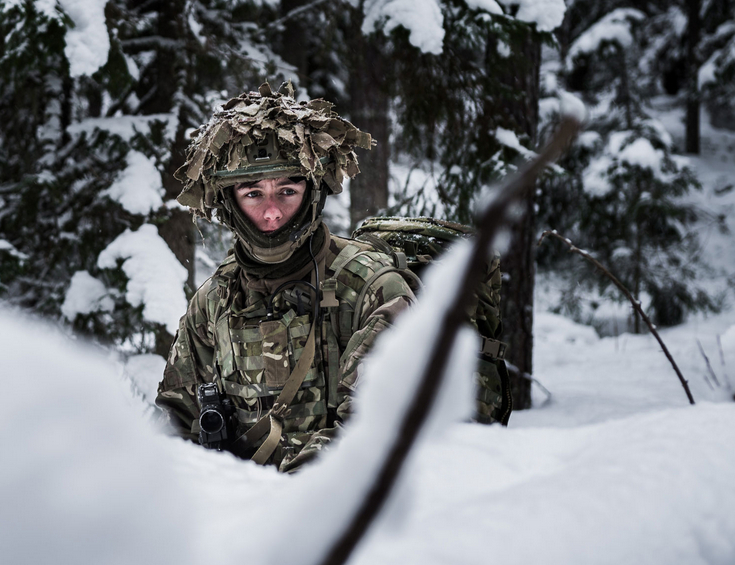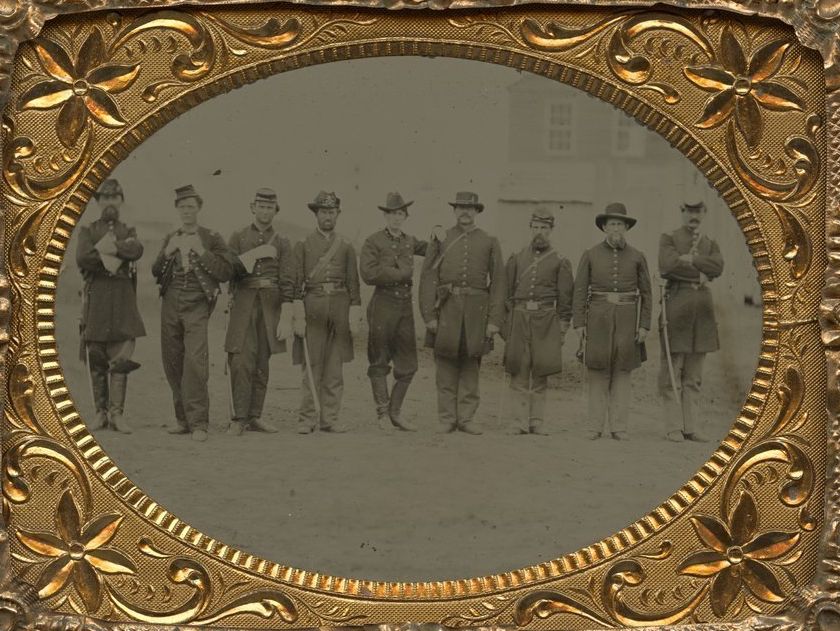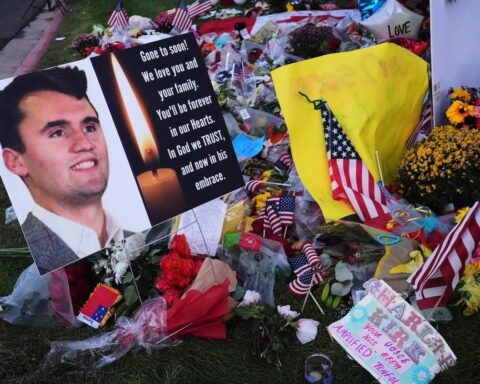Editor’s note: The following short story was published in Galaxy Science Fiction (July 1953).
In the northland, deep, and in a great cave, by an everburning fire the Warrior sleeps. For this is the resting time, the time of peace, and so shall it be for a thousand years. And yet we shall summon him again, my children, when we are sore in need, and out of the north he will come, and again and again, each time we call, out of the dark and the cold, with the fire in his hands, he will come.
—Scandinavian legend
Throughout the night, thick clouds had been piling in the north; in the morning, it was misty and cold. By eight o’clock a wet, heavy, snow-smelling breeze had begun to set in, and because the crops were all down and the winter planting done, the colonists brewed hot coffee and remained inside. The wind blew steadily, icily from the north. It was well below freezing when, some time after nine, an army ship landed in a field near the settlement.

There was still time. There were some last brief moments in which the colonists could act and feel as they had always done. They therefore grumbled in annoyance. They wanted no soldiers here. The few who had convenient windows stared out with distaste and a mild curiosity, but no one went out to greet them.
After a while a rather tall, frail-looking man came out of the ship and stood upon the hard ground looking toward the village. He remained there, waiting stiffly, his face turned from the wind. It was a silly thing to do. He was obviously not coming in, either out of pride or just plain orneriness.
“Well, I never,” a nice lady said.
“What’s he just standing there for?” another lady said.
And all of them thought: well, God knows what’s in the mind of a soldier, and right away many people concluded that he must be drunk. The seed of peace was deeply planted in these people, in the children and the women, very, very deep. And because they had been taught, oh so carefully, to hate war they had also been taught, quite incidentally, to despise soldiers.
The lone man kept standing in the freezing wind.
______________________________________________________________________________
Eventually, because even a soldier can look small and cold and pathetic, Bob Rossel had to get up out of a nice, warm bed and go out in that miserable cold to meet him.
The soldier saluted. Like most soldiers, he was not too neat and not too clean and the salute was sloppy. Although he was bigger than Rossel he did not seem bigger. And, because of the cold, there were tears gathering in the ends of his eyes.
“Captain Dylan, sir.” His voice was low and did not carry. “I have a message from Fleet Headquarters. Are you in charge here?”
Rossel, a small sober man, grunted. “Nobody’s in charge here. If you want a spokesman I guess I’ll do. What’s up?”
The captain regarded him briefly out of pale blue, expressionless eyes. Then he pulled an envelope from an inside pocket, handed it to Rossel. It was a thick, official-looking thing and Rossel hefted it idly. He was about to ask again what was it all about when the airlock of the hovering ship swung open creakily. A beefy, black-haired young man appeared unsteadily in the doorway, called to Dylan.
“C’n I go now, Jim?”
Dylan turned and nodded.
“Be back for you tonight,” the young man called, and then, grinning, he yelled “Catch” and tossed down a bottle. The captain caught it and put it unconcernedly into his pocket while Rossel stared in disgust. A moment later the airlock closed and the ship prepared to lift.
“Was he drunk?” Rossel began angrily. “Was that a bottle of liquor?”
The soldier was looking at him calmly, coldly. He indicated the envelope in Rossel’s hand. “You’d better read that and get moving. We haven’t much time.”
He turned and walked toward the buildings and Rossel had to follow. As Rossel drew near the walls the watchers could see his lips moving but could not hear him. Just then the ship lifted and they turned to watch that, and followed it upward, red spark-tailed, into the gray spongy clouds and the cold.
______________________________________________________________________________
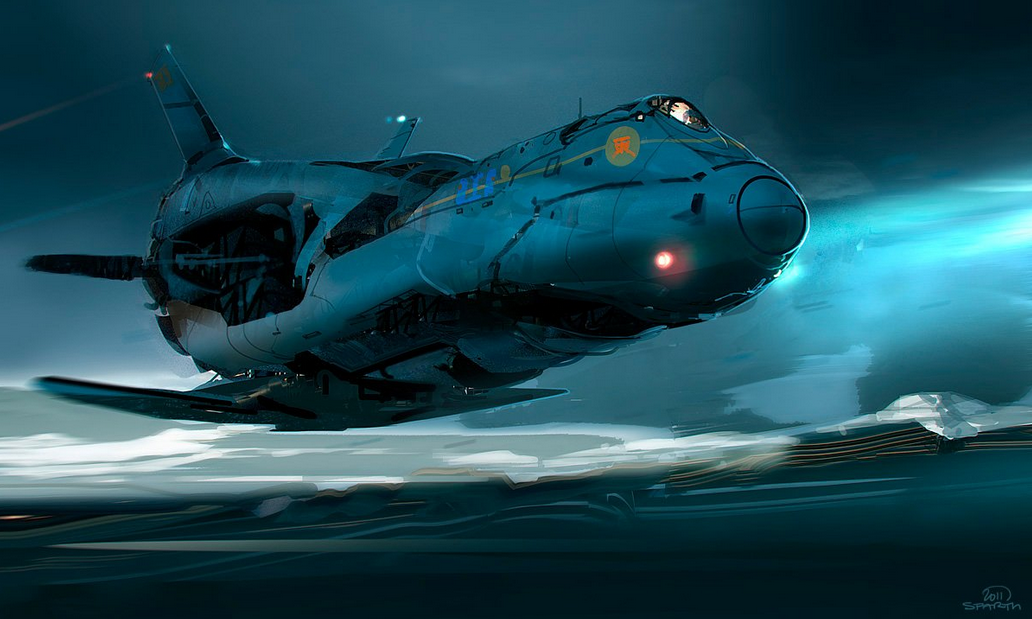
After a while the ship went out of sight, and nobody ever saw it again.
______________________________________________________________________________
The first contact Man had ever had with an intelligent alien race occurred out on the perimeter in a small quiet place a long way from home. Late in the year 2360—the exact date remains unknown—an alien force attacked and destroyed the colony at Lupus V. The wreckage and the dead were found by a mailship which flashed off screaming for the army.
When the army came it found this: Of the seventy registered colonists, thirty-one were dead. The rest, including some women and children, were missing. All technical equipment, all radios, guns, machines, even books, were also missing. The buildings had been burned, so were the bodies. Apparently the aliens had a heat ray. What else they had, nobody knew. After a few days of walking around in the ash, one soldier finally stumbled on something.
For security reasons, there was a detonator in one of the main buildings. In case of enemy attack, Security had provided a bomb to be buried in the center of each colony, because it was important to blow a whole village to hell and gone rather than let a hostile alien learn vital facts about human technology and body chemistry. There was a bomb at Lupus V too, and though it had been detonated it had not blown. The detonating wire had been cut.
In the heart of the camp, hidden from view under twelve inches of earth, the wire had been dug up and cut.
The army could not understand it and had no time to try. After five hundred years of peace and anti-war conditioning the army was small, weak and without respect. Therefore, the army did nothing but spread the news, and Man began to fall back.
In a thickening, hastening stream he came back from the hard-won stars, blowing up his homes behind him, stunned and cursing. Most of the colonists got out in time. A few, the farthest and loneliest, died in fire before the army ships could reach them. And the men in those ships, drinkers and gamblers and veterans of nothing, the dregs of a society which had grown beyond them, were for a long while the only defense Earth had.
This was the message Captain Dylan had brought, come out from Earth with a bottle on his hip.
______________________________________________________________________________
An obscenely cheerful expression upon his gaunt, not too well shaven face, Captain Dylan perched himself upon the edge of a table and listened, one long booted leg swinging idly. One by one the colonists were beginning to understand. War is huge and comes with great suddenness and always without reason, and there is inevitably a wait, between acts, between the news and the motion, the fear and the rage.
Dylan waited. These people were taking it well, much better than those in the cities had taken it. But then, these were pioneers. Dylan grinned. Pioneers. Before you settle a planet you boil it and bake it and purge it of all possible disease. Then you step down gingerly and inflate your plastic houses, which harden and become warm and impregnable; and send your machines out to plant and harvest; and set up automatic factories to transmute dirt into coffee; and, without ever having lifted a finger, you have braved the wilderness, hewed a home out of the living rock and become a pioneer. Dylan grinned again. But at least this was better than the wailing of the cities.
This Dylan thought, although he was himself no fighter, no man at all by any standards. This he thought because he was a soldier and an outcast; to every drunken man the fall of the sober is a happy thing. He stirred restlessly.
By this time the colonists had begun to realize that there wasn’t much to say, and a tall, handsome woman was murmuring distractedly: “Lupus, Lupus—doesn’t that mean wolves or something?”
Dylan began to wish they would get moving, these pioneers. It was very possible that the aliens would be here soon, and there was no need for discussion. There was only one thing to do and that was to clear the hell out, quickly and without argument. They began to see it.
But, when the fear had died down, the resentment came. A number of women began to cluster around Dylan and complain, working up their anger. Dylan said nothing. Then the man Rossel pushed forward and confronted him, speaking with a vast annoyance.
“See here, soldier, this is our planet. I mean to say, this is our home. We demand some protection from the fleet. By God, we’ve been paying the freight for you boys all these years and it’s high time you earned your keep. We demand….”
It went on and on while Dylan looked at the clock and waited. He hoped that he could end this quickly. A big gloomy man was in front of him now and giving him that name of ancient contempt, “soldier boy.” The gloomy man wanted to know where the fleet was.
“There is no fleet. There are a few hundred half-shot old tubs that were obsolete before you were born. There are four or five new jobs for the brass and the government. That’s all the fleet there is.”
______________________________________________________________________________
Dylan wanted to go on about that, to remind them that nobody had wanted the army, that the fleet had grown smaller and smaller … but this was not the time. It was ten-thirty already and the damned aliens might be coming in right now for all he knew, and all they did was talk. He had realized a long time ago that no peace-loving nation in the history of Earth had ever kept itself strong, and although peace was a noble dream, it was ended now and it was time to move.
“We’d better get going,” he finally said, and there was quiet. “Lieutenant Bossio has gone on to your sister colony at Planet Three of this system. He’ll return to pick me up by nightfall and I’m instructed to have you gone by then.”
For a long moment they waited, and then one man abruptly walked off and the rest followed quickly; in a moment they were all gone. One or two stopped long enough to complain about the fleet, and the big gloomy man said he wanted guns, that’s all, and there wouldn’t nobody get him off his planet. When he left, Dylan breathed with relief and went out to check the bomb, grateful for the action.
Most of it had to be done in the open. He found a metal bar in the radio shack and began chopping at the frozen ground, following the wire. It was the first thing he had done with his hands in weeks, and it felt fine.
Dylan had been called up out of a bar—he and Bossio—and told what had happened, and in three weeks now they had cleared four colonies. This would be the last, and the tension here was beginning to get to him. After thirty years of hanging around and playing like the town drunk, a man could not be expected to rush out and plug the breach, just like that. It would take time.
He rested, sweating, took a pull from the bottle on his hip.
Before they sent him out on this trip they had made him a captain. Well, that was nice. After thirty years he was a captain. For thirty years he had bummed all over the west end of space, had scraped his way along the outer edges of Mankind, had waited and dozed and patrolled and got drunk, waiting always for something to happen. There were a lot of ways to pass the time while you waited for something to happen, and he had done them all.
Once he had even studied military tactics.
He could not help smiling at that, even now. Damn it, he’d been green. But he’d been only nineteen when his father died—of a hernia, of a crazy fool thing like a hernia that killed him just because he’d worked too long on a heavy planet—and in those days the anti-war conditioning out on the Rim was not very strong. They talked a lot about guardians of the frontier, and they got him and some other kids and a broken-down doctor. And … now he was a captain.
He bent his back savagely, digging at the ground. You wait and you wait and the edge goes off. This thing he had waited for all those damn days was upon him now and there was nothing he could do but say the hell with it and go home. Somewhere along the line, in some dark corner of the bars or the jails, in one of the million soul-murdering insults which are reserved especially for peacetime soldiers, he had lost the core of himself, and it didn’t particularly matter. That was the point: it made no particular difference if he never got it back. He owed nobody. He was tugging at the wire and trying to think of something pleasant from the old days, when the wire came loose in his hands.
Although he had been, in his cynical way, expecting it, for a moment it threw him and he just stared. The end was clean and bright. The wire had just been cut.
______________________________________________________________________________
Dylan sat for a long while by the radio shack, holding the ends in his hands. He reached almost automatically for the bottle on his hip and then, for the first time he could remember, let it go. This was real, there was no time for that.
When Rossel came up, Dylan was still sitting. Rossel was so excited he did not notice the wire.
“Listen, soldier, how many people can your ship take?”
Dylan looked at him vaguely. “She sleeps two and won’t take off with more’n ten. Why?”
His eyes bright and worried, Rossel leaned heavily against the shack. “We’re overloaded. There are sixty of us and our ship will only take forty. We came out in groups, we never thought….”
Dylan dropped his eyes, swearing silently. “You’re sure? No baggage, no iron rations; you couldn’t get ten more on?”
“Not a chance. She’s only a little ship with one deck—she’s all we could afford.”
Dylan whistled. He had begun to feel light-headed. “It ‘pears that somebody’s gonna find out first hand what them aliens look like.”
It was the wrong thing to say and he knew it. “All right,” he said quickly, still staring at the clear-sliced wire, “we’ll do what we can. Maybe the colony on Three has room. I’ll call Bossio and ask.”
The colonist had begun to look quite pitifully at the buildings around him and the scurrying people.
“Aren’t there any fleet ships within radio distance?”
Dylan shook his head. “The fleet’s spread out kind of thin nowadays.” Because the other was leaning on him he felt a great irritation, but he said, as kindly as he could, “We’ll get ’em all out. One way or another, we won’t leave anybody.”
It was then that Rossel saw the wire. Thickly, he asked what had happened.
Dylan showed him the two clean ends. “Somebody dug it up, cut it, then buried it again and packed it down real nice.”
“The damn fool!” Rossel exploded.
“Who?”
“Why, one of … of us, of course. I know nobody ever liked sitting on a live bomb like this, but I never….”
“You think one of your people did it?”
Rossel stared at him. “Isn’t that obvious?”
“Why?”
“Well, they probably thought it was too dangerous, and silly too, like most government rules. Or maybe one of the kids….”
______________________________________________________________________________
It was then that Dylan told him about the wire on Lupus V. Rossel was silent. Involuntarily, he glanced at the sky, then he said shakily, “Maybe an animal?”
Dylan shook his head. “No animal did that. Wouldn’t have buried it, or found it in the first place. Heck of a coincidence, don’t you think? The wire at Lupus was cut just before an alien attack, and now this one is cut too—newly cut.”
The colonist put one hand to his mouth, his eyes wide and white.
“So something,” said Dylan, “knew enough about this camp to know that a bomb was buried here and also to know why it was here. And that something didn’t want the camp destroyed and so came right into the center of the camp, traced the wire, dug it up and cut it. And then walked right out again.”
“Listen,” said Rossel, “I’d better go ask.”
He started away but Dylan caught his arm.
“Tell them to arm,” he said, “and try not to scare hell out of them. I’ll be with you as soon as I’ve spliced this wire.”
Rossel nodded and went off, running. Dylan knelt with the metal in his hands.
He began to feel that, by God, he was getting cold. He realized that he’d better go inside soon, but the wire had to be spliced. That was perhaps the most important thing he could do now, splice the wire.
All right, he asked himself for the thousandth time, who cut it? How? Telepathy? Could they somehow control one of us?
No. If they controlled one, then they could control all, and then there would be no need for an attack. But you don’t know, you don’t really know.
Were they small? Little animals?
Unlikely. Biology said that really intelligent life required a sizable brain and you would have to expect an alien to be at least as large as a dog. And every form of life on this planet had been screened long before a colony had been allowed in. If any new animals had suddenly shown up, Rossel would certainly know about it.
He would ask Rossel. He would damn sure have to ask Rossel.
He finished splicing the wire and tucked it into the ground. Then he straightened up and, before he went into the radio shack, he pulled out his pistol. He checked it, primed it, and tried to remember the last time he had fired it. He never had—he never had fired a gun.
______________________________________________________________________________
The snow began falling near noon. There was nothing anybody could do but stand in the silence and watch it come down in a white rushing wall, and watch the trees and the hills drown in the whiteness, until there was nothing on the planet but the buildings and a few warm lights and the snow.
By one o’clock the visibility was down to zero and Dylan decided to try to contact Bossio again and tell him to hurry. But Bossio still didn’t answer. Dylan stared long and thoughtfully out the window through the snow at the gray shrouded shapes of bushes and trees which were beginning to become horrifying. It must be that Bossio was still drunk—maybe sleeping it off before making planetfall on Three. Dylan held no grudge. Bossio was a kid and alone. It took a special kind of guts to take a ship out into space alone, when Things could be waiting….
A young girl, pink and lovely in a thick fur jacket, came into the shack and told him breathlessly that her father, Mr. Rush, would like to know if he wanted sentries posted. Dylan hadn’t thought about it but he said yes right away, beginning to feel both pleased and irritated at the same time, because now they were coming to him.
He pushed out into the cold and went to find Rossel. With the snow it was bad enough, but if they were still here when the sun went down they wouldn’t have a chance. Most of the men were out stripping down their ship and that would take a while. He wondered why Rossel hadn’t yet put a call through to Three, asking about room on the ship there. The only answer he could find was that Rossel knew that there was no room, and he wanted to put off the answer as long as possible. And, in a way, you could not blame him.
Rossel was in his cabin with the big, gloomy man—who turned out to be Rush, the one who had asked about sentries. Rush was methodically cleaning an old hunting rifle. Rossel was surprisingly full of hope.
“Listen, there’s a mail ship due in, been due since yesterday. We might get the rest of the folks out on that.”
Dylan shrugged. “Don’t count on it.”
“But they have a contract!”
The soldier grinned.
The big man, Rush, was paying no attention. Quite suddenly he said: “Who cut that wire, Cap?”
______________________________________________________________________________
Dylan swung slowly to look at him. “As far as I can figure, an alien cut it.”
Rush shook his head. “No. Ain’t been no aliens near this camp, and no peculiar animals either. We got a planet-wide radar, and ain’t no unidentified ships come near, not since we first landed more’n a year ago.” He lifted the rifle and peered through the bore. “Uh-uh. One of us did it.”
The man had been thinking. And he knew the planet.
“Telepathy?” asked Dylan.
“Might be.”
“Can’t see it. You people live too close, you’d notice right away if one of you wasn’t … himself. And, if they’ve got one, why not all?”
Rush calmly—at least outwardly calmly—lit his pipe. There was a strength in this man that Dylan had missed before.
“Don’t know,” he said gruffly. “But these are aliens, mister. And until I know different I’m keepin’ an eye on my neighbor.”
He gave Rossel a sour look and Rossel stared back, uncomprehending.
Then Rossel jumped. “My God!”
Dylan moved to quiet him. “Look, is there any animal at all that ever comes near here that’s as large as a dog?”
After a pause, Rush answered. “Yep, there’s one. The viggle. It’s like a reg’lar monkey but with four legs. Biology cleared ’em before we landed. We shoot one now and then when they get pesky.” He rose slowly, the rifle held under his arm. “I b’lieve we might just as well go post them sentries.”
Dylan wanted to go on with this but there was nothing much else to say. Rossel went with them as far as the radio shack, with a strained expression on his face, to put through that call to Three.
When he was gone Rush asked Dylan, “Where you want them sentries? I got Walt Halloran and Web Eggers and six others lined up.”
Dylan stopped and looked around grimly at the circling wall of snow. “You know the site better than I do. Post ’em in a ring, on rises, within calling distance. Have ’em check with each other every five minutes. I’ll go help your people at the ship.”
The gloomy man nodded and fluffed up his collar. “Nice day for huntin’,” he said, and then he was gone with the snow quickly covering his footprints.
______________________________________________________________________________
The Alien lay wrapped in a thick electric cocoon, buried in a wide warm room beneath the base of a tree. The tree served him as antennae; curiously he gazed into a small view-screen and watched the humans come. He saw them fan out, eight of them, and sink down in the snow. He saw that they were armed.
______________________________________________________________________________
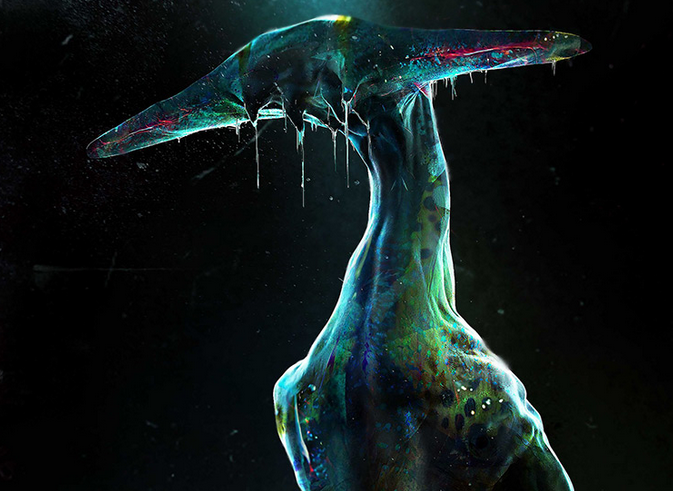
______________________________________________________________________________
He pulsed thoughtfully, extending a part of himself to absorb a spiced lizard. Since the morning, when the new ship had come, he had been watching steadily, and now it was apparent that the humans were aware of their danger. Undoubtedly they were preparing to leave.
That was unfortunate. The attack was not scheduled until late that night and he could not, of course, press the assault by day. But flexibility, he reminded himself sternly, is the first principle of absorption, and therefore he moved to alter his plans. A projection reached out to dial several knobs on a large box before him, and the hour of assault was moved forward to dusk. A glance at the chronometer told him that it was already well into the night on Planet Three, and that the attack there had probably begun.
The Alien felt the first tenuous pulsing of anticipation. He lay quietly, watching the small square lights of windows against the snow, thanking the Unexplainable that matters had been so devised that he would not have to venture out into that miserable cold.
Presently an alarming thought struck him. These humans moved with uncommon speed for intelligent creatures. Even without devices, it was distinctly possible that they could be gone before nightfall. He could take no chance, of course. He spun more dials and pressed a single button, and lay back again comfortably, warmly, to watch the disabling of the colonists’ ship.

